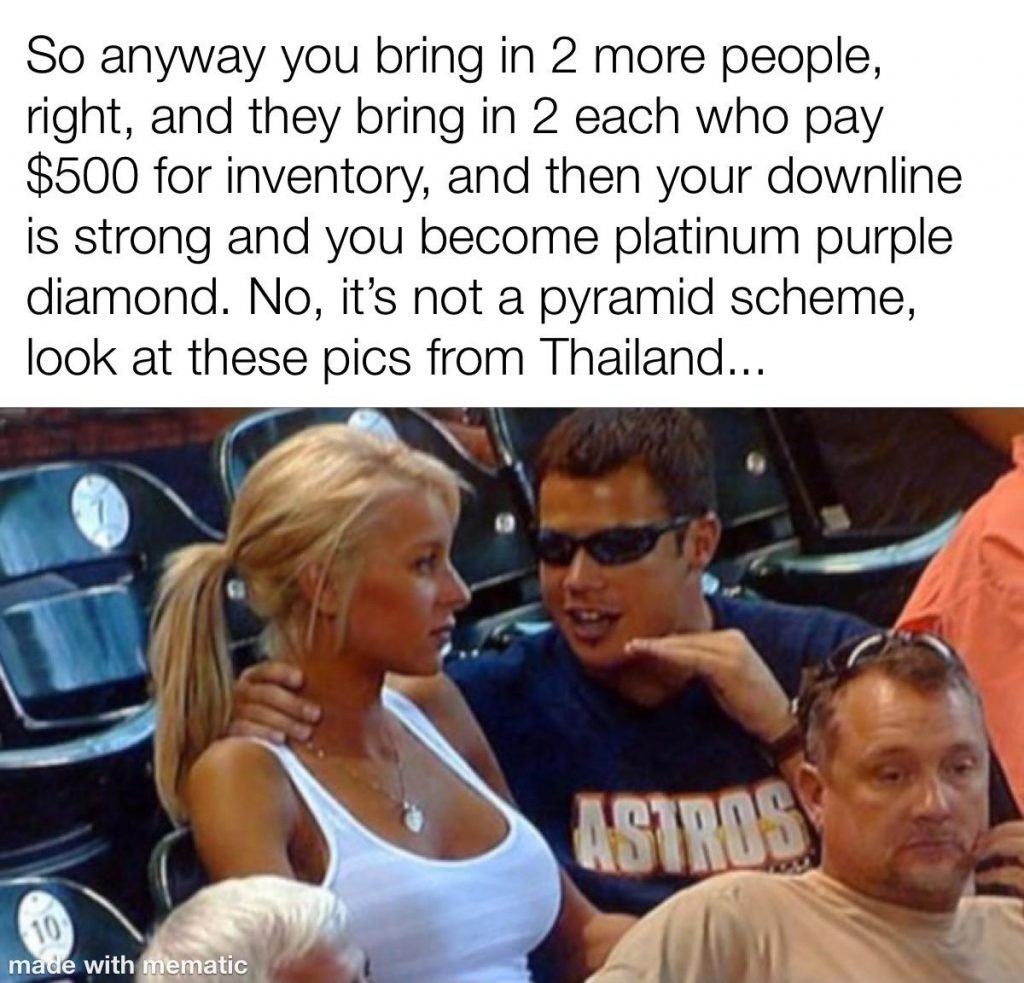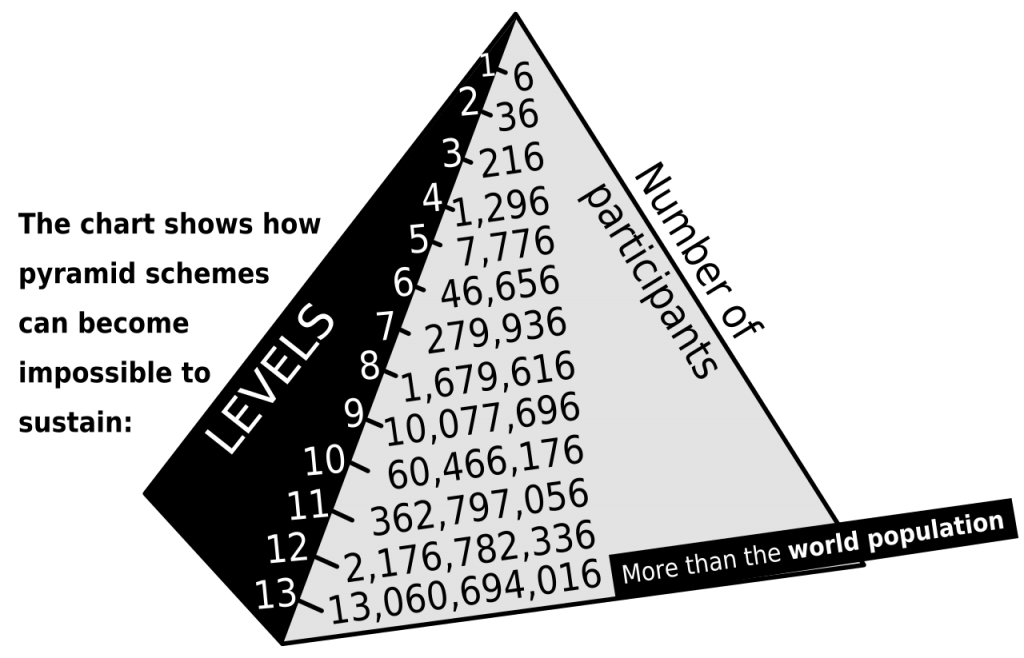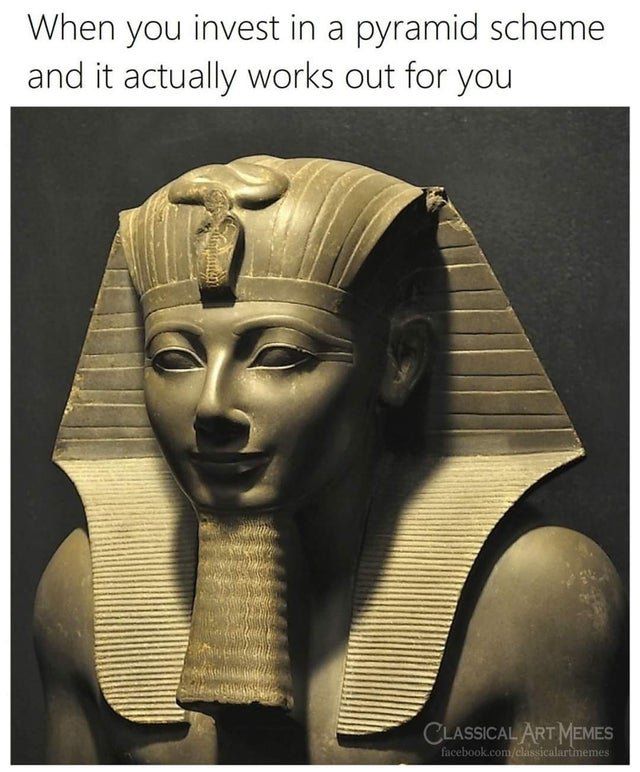Is Beachbody a Pyramid Scheme? A Deep Dive Into the Beachbody MLM
If you’re reading this article then chances are you’ve been approached by a Beachbody coach who has invited you to join her ‘team’ or ‘challenge group’ or ‘start your own business.’
It sounds like a great opportunity.
After all, who wouldn’t want to get in shape and live a healthier lifestyle, make a tonne of new friends and run their own successful business, all from the comfort of your own home?
However, you’re hesitant.
Maybe you think that the opportunity just sounds too good to be true, or perhaps you’ve heard people throwing around things like ‘Beachbody is a pyramid scheme!’ and ‘Beachbody is a scam!’ and you’re wary.
So, is Beachbody a pyramid scheme?

When you type ‘is Beachbody a pyramid scheme?’ into Google, more than half of the results on the first page are articles written by people who are a part of Beachbody.
This is problematic for a number of reasons.
First, those people are automatically biased in favour of Beachbody. They don’t want people thinking little of them or their work, and as pyramid schemes are illegal, they don’t want to implicate themselves.
Secondly, we must remember that Beachbody coaches make money off every single person that joins the company through them.
In other words, if they can convince you that Beachbody is a great opportunity, they will make money.
Naturally, they are going to want to paint the company in a good light.
It’s also clear that many of these people have no idea what a pyramid scheme actually is, meaning that they probably aren’t the best people to be writing articles about whether a company meets this definition or not! I actually saw one of these articles make the argument that ‘every 9 to 5 job is a pyramid scheme’ which is just…wrong.
With this in mind, I decided to do a deep dive into Beachbody to discover the truth about whether Beachbody is a legitimate business opportunity, or just another scammy MLM company functioning as a pyramid scheme.
This will be a long one, so grab yourself a coffee and get comfy.
Let’s get into it.
Is Beachbody a Pyramid Scheme? A Deep Dive Into the Beachbody MLM
Before we get into whether Beachbody is a pyramid scheme or not, it is crucial that we understand a few things.
First – what does MLM mean and what is an MLM company?
Second – what exactly is a pyramid scheme? Aren’t pyramid schemes illegal?!
Finally, we need to follow the money trail and attempt to answer some questions about Beachbody to find out whether it meets the criteria of a pyramid scheme.
Some warning signs of pyramid schemes include:
– Are most people unable to profit?
– Do you have to ‘pay to play?’
– Is there a focus on recruitment?
If the answers to the following questions is YES then Beachbody may be operating as a pyramid scheme in disguise.
Let’s dive in.

What is an MLM company?
MLM stands for multi-level marketing, and MLM companies are also known as network marketing or direct sales companies.
You don’t receive a salary in an MLM.
Instead, you earn money from selling products to people you know and recruiting others into the business. When you recruit a new person and that person begins earning money, you will earn commission from the sales and recruits generated from THAT person.
This continues down in multiple levels (hence multi-level).
Imagine a triangle. If the person at the very top of the triangle recruits 10 people, and each of those 10 people recruit another 10 people, and each one of those people recruit another 10 people, you will be making commissions from EVERYBODY in the triangle because they are all in your direct downline (the people underneath you in an MLM are known as your ‘downline’ and you are their ‘upline’).
All you had to do was recruit 10 people and you make money from 1100.
While you can always make money from selling whichever product your MLM company offers, most people in MLM companies prefer to recruit others because they stand to make a lifelong passive income from that person, whereas if they sell a product they will just receive a one-off commission.
As there is a lot of money trickling up to the top of the triangle, the people at the top are making a lot of money, while the people at the bottom are making the least.
The ultimate aim of somebody in an MLM scheme like Beachbody therefore, is to have as many people in their ‘downline’ as possible, enabling them to make large amounts of passive income for little work.

What is a pyramid scheme?
Pyramid schemes are similar to MLMs, but the main difference is that MLM companies sell a product as well as paying people to recruit others into the business.
A pyramid scheme simply takes an initial investment from each member and promises to pay them for enrolling others into the scheme.
You are never buying a product; you are buying into an ‘opportunity’ to get rich.
However, as members of the scheme increase, recruiting quickly becomes impossible and so most members are unable to profit from the scheme or even make their initial investment back.
The Wikipedia diagram below illustrates just how unsustainable this business model is – after just a few levels of recruitment, the scheme would have recruited everybody on the planet and there would simply be no-one left to recruit!

Because it is impossible for most people to make any money in a pyramid scheme, pyramid schemes are illegal.
MLM companies are not illegal because there is a possibility to make money from selling products and not just recruiting.
However, this doesn’t mean that some MLM companies are not still operating as pyramid schemes in disguise.
Although a business may be carefully crafted to appear like a totally legit multi-level marketing company, it could still be exploiting loopholes in order to skirt around the law and function as a pyramid scheme in disguise.
In order to assess whether Beachbody is a pyramid scheme, we must dive in deep and look at just how this company operates.
Are you with me so far?
I hope so, because it’s only going to get more confusing from here.
What is Beachbody?
Beachbody was founded in 1998 by Carl Daikeler and Jon Congdon in Santa Monica, California.
It is a fitness and nutrition company that offers a wide variety of workout regimes (the INSANITY and P90X regimes are Beachbody), meal plans and nutritional supplements in the form of various powders, proteins, shakes etc.
The Beachbody product that is pushed the most is Shakeology. Shakeology refers to a group of ‘superfood rich’ shakes that are supposed to stop you from ‘pigging out’ in between meals and they come in flavours including chocolate and café latte (although the jury seems to be out on whether they actually taste like those things).
In Beachbody’s early days, it was not a multi-level marketing company, instead relying heavily on traditional advertising such as late night infomercials to spread awareness of its products.
Then, about 8 years into its journey, Beachbody decided that the real money to be made was in multi-level marketing, and so it launched Team Beachbody, the MLM leg of its company.
Sidenote: this is very similar to Avon, who only implemented the MLM structure fairly recently.
Today, there are more than 400,000 Beachbody ‘coaches’ selling shakes and workout regimes.
Beachbody also has its own subscription service called Beachbody On Demand, which allows you to access all kinds of training videos on any device.
The idea of Beachbody On Demand is that you will work through the programmes with the help and support of a Beachbody ‘Coach’ who will hold you accountable, give you tips and motivation, and answer any questions you may have about working out and eating well.
This sounds pretty great, right?
Not so fast.

The problem with Beachbody Coaches
Definitions of the word ‘coach’ include ‘an instructor or trainer in sport,’ ‘a private tutor who gives extra teaching’ and somebody who ‘gives somebody professional advice on how to attain their goals.’
In other words, somebody with expertise and knowledge on a given area, who uses that expertise to help others.
So, if somebody is ‘coaching’ you on fitness and nutrition, you would expect them to have some kind of qualifications in those fields, right?
Not Beachbody Coaches.
In fact, in Beachbody, a ‘coach’ is actually just the name given to the distributors of the products.
All you need to become a Beachbody Coach and advise people on the best nutritional supplements for them and what workout will achieve their dream body, is proof that you’re over the age of 18, a social security number and proof that you’ve bought their ‘Coach Business Kit.’
Yeah. That’s right.
Beachbody coaches do not need to have any training or qualifications related to health, fitness, nutrition etc.
Call me old-fashioned, but if I’m being coached on anything even remotely related to my physical and mental health, I’m gonna need more than that.
But we’re getting off-topic.
Let’s get back to unpacking Beachbody as a business in order to find out whether Beachbody is actually a pyramid scheme.

‘But it has products – it can’t be a pyramid scheme!’
One of the main arguments that Beachbody coaches have is that pyramid schemes do not sell products so they can’t possibly be a pyramid scheme because they have shakes, supplements, workouts etc.
However, a business can still function as a pyramid scheme even if it does have products.
The key is in the pricing.
Allow me to explain.
Beachbody products are expensive.
A one-month supply of Shakeology will set you back $129.95 ($4.33 a serving) which is way more expensive than similar shakes.
Seriously, there are many Shakeology alternatives that are a fraction of the price.
So why are they so expensive?
Well, you’re not actually just paying for the shake itself when you order a month’s supply of Shakeology.
This pen analogy over at Lazy Man and Money explains it in more detail:
‘Say Mr Pyramid buys pens in bulk from Staples and sells them for $100 each. Who’s gonna pay $100 for a pen? But tell them that they can also sell pens for $100, and we’ll pay you $30 for every pen you sell, plus you can recruit people to sell pens as well, and you’ll get $10 for every pen they sell, and $5 for every pen their recruits sell.
Three levels, $45 commissions total on a $100 sale. Everyone has to buy 10 pens a month for personal use to participate in the program. Just find three people who find three people who find three people… In the end, yeah, you are buying 10 pens a month for $1000, but you are getting $3150 in commissions, so don’t sweat it.
Why wouldn’t you join?
Product is moving.
The pens get used.
No recruitment revenue, only product commissions.
Absolutely 100% a pyramid scheme. The only real reason people are paying $100 for a pen is for the opportunity to make money off the sale of pens.
Completely unsustainable as eventually, you run out of people to sell to and those at the bottom get hosed by buying $1000 pens but not being able to sell them. This is an extreme example, but if you look at the world of MLM, there are some pretty big name companies out there that somewhat fit this mould on a less cut and dry basis.’

Suddenly, the fact that Beachbody has its own products seems much less relevant now, hey?
It is also worth noting that several MLM companies that sell products have been found to be illegal pyramid schemes by the FTC and shut down.
So, now that we know that companies can definitely still operate as pyramid schemes despite having products, let’s take a look at whether Beachbody meets our earlier criteria of operating as a pyramid scheme.
Is Beachbody a pyramid scheme? The tough questions
How much money can you earn with Beachbody? (Are most people unable to profit?)
Beachbody coaches are notorious for flaunting their lavish lifestyles that their business has brought them.
They express gratitude to the company for allowing them to ‘live their best lives’ and work as and when they please.
But is the Beachbody opportunity as good as it seems?
Can you make money with Beachbody?
Let’s take a look at the numbers.
Here is a link to Beachbody’s income disclosure statement from 2019-2020.
This is the document that allows us to see exactly how many people are earning money with Beachbody, and how much of it they’re making.
Now, the small print states that this table only takes into account coaches who worked for the entire year.
In other words, if somebody joined the business, decided that it wasn’t for them and quit after a few months, their earnings are not represented here.
This means that the results are already skewed because most people who are not doing well in something will quit before the 12 month mark.
The small print also states that only 43.8% of all coaches received any compensation from Beachbody, meaning that 56% of Beachbody coaches made no money in 2020.
This table only applies to that 43.8% of coaches who earned anything with Beachbody.

Now, of these 43.8%, 76.1% of them made an average of $439 for the whole year.
That’s $36.50 per month.
A further 19.1% of Beachbody coaches who earned money in 2020 made an average of $3142 that year, or $261 a month.
The next highest earners in Beachbody were Ruby Coaches, who made an average of $1015 a month.
Ruby Coaches account for just 0.8% of Beachbody coaches who earned money in 2020.
The only ‘real’ money being made in Beachbody is by those who have reached the Star Diamond level.
Those guys raked in an average of $116,539 in the year 2020.
Too bad they only account for 1.4% of earners!
Again, I’ll reiterate that this 1.4% is not 1.4% of all Beachbody coaches.
It is 1.4% of the 43.8% of Beachbody coaches who earned more than $0!
These numbers paint a pretty bleak picture, but unfortunately, that isn’t all.
You see, these figures do not take into account the expenses associated with being a Beachbody coach.
When you do factor in those initial costs, it is very likely that the 76.1% of coaches who made $439 in 2020, actually lost money.
Let’s break it down.

How much does it cost to join Beachbody? (Do you have to ‘pay to play?’)
To sign up to Beachbody, you must pay a one-time fee of $39.95.
After 30 days, you will be charged $15.95 a month to remain in the company.
This amounts to $175.45 per year plus $39.95 equals $215.40.
One way that you can waive this $39.95 sign-up fee is by purchasing a ‘challenge pack.’ Of course, the catch is that challenge packs cost anywhere between $140 and $275.
Now, officially the $15.95 monthly fee pays for your Beachbody website, but people in regular jobs don’t have to pay to use the company’s platform. My boyfriend uses Linkedin Recruiter for his job, but his boss pays for it, because that’s just how things work when your company isn’t exploiting you.
Other Beachbody expenses are not mandatory but highly encouraged.
For instance, you can pay an additional $2.99 a week ($155.48 a year) to be a ‘Club Member,’ which will then give you the option to qualify for the ‘customer lead programme.’ This means that if somebody signs up to be a coach through the official Beachbody website, you will be placed into the pool of coaches who they *could* get placed with.
In other words, you’re paying $155 for a chance at making some extra commission later down the line.
There is also the Beachbody Coach Summit, a conference that costs almost $300 not including airfare, accommodation, food etc.
Again, this conference is not mandatory but there is a huge pressure placed on coaches to attend, and if they decide not to, they will be told that ‘you’re just not working hard enough’ and ‘you obviously don’t want this enough.’
We haven’t even touched on the fact that you are expected to buy and use Beachbody products.
I mean, how can you tell your followers how good they are unless you use them yourself?
Again, this is not a requirement, but I have personally never encountered a Beachbody coach who doesn’t use the products.
Yet another potential expense is the need to buy products in order to get paid in the first place.
You see, in order to qualify for commission, you have to maintain a ‘personal volume’ of 50 (which is basically a certain number of sales) per month – if your customers aren’t making that happen, you can make it happen yourself by buying products.
If you don’t hit a personal volume, you won’t be ‘active’ which means you won’t qualify for bonuses.
It all adds up, and when you remember that most Beachbody coaches earn nothing at all, every penny you spend on the business is a loss.

How do you make money with Beachbody? (Is there a focus on recruitment?)
In pyramid schemes, there is a huge focus on recruitment.
In other words, if Beachbody is a pyramid scheme then its coaches are more likely to be pushing the ‘business opportunity’ rather than the products.
Of course, they will still advertise the products as well, but the focus is more on the ‘Beachbody lifestyle’ and the opportunity to ‘own your own business’ and ‘achieve financial freedom.’
Now, like with any MLM, the Beachbody compensation plan is veeery complicated (almost as if they don’t want you to understand it).
However, what we can see is that Beachbody coaches get awarded various commissions for selling various things. For example, if you recruit somebody into a ‘challenge group’ and they buy a challenge pack, you will receive a 36% commission. If you convince somebody to sign up to Beachbody On Demand, you will make a 40% commission, and so on.
However, successful Beachbody coach Kellie Gimenez shows that the real money to be made in Beachbody is by signing people up to ‘the business.’
She says: ‘A majority of your income isn’t going to be coming from the products. The majority of your income, as you grow a team, is going to come from your Coaches and the volume they sell. Because you can only sell so many workouts a month…If they aren’t drinking Shakeology every month, I mean, they can buy one workout and never buy anything else from you. When I first started as a coach and didn’t have a team underneath me, I was making about $500 selling products. That’s not bad. It paid for our groceries. It paid for gas. It was a good income, but it’s definitely not something that could be a successful side hustle.’
As Kellie explains, most of her income comes from the things her downline sells.

The FTC says that ‘One sign of a pyramid scheme is if distributors sell more product to other distributors than to the public — or if they make more money from recruiting than they do from selling.’
As we can see, by recruiting more and more people into her downline, Kellie stands to make more money. Product sales alone to retail customers is not enough to sustain her.
It is only by recruiting others that she sees real financial growth.
However, as we said before, you and your team can only recruit so many people before you’ve recruited the whole planet!
Somewhere down the line, somebody is not going to have anyone left to recruit, and this is why so many people in MLMs lose money.
I digress.
In order to even receive commissions from your downline in Beachbody like Kellie does, you have to meet very strict criteria.
Here’s how it works:
Beachbody uses something called a ‘binary compensation model,’ which means that if you want to make money, you must have at least two ‘legs’ in your pyramid.
One right leg, and one left leg.
Each of these ‘legs’ is a person that is underneath you.
When you recruit somebody else, you can choose to put them in either your left ‘leg’ or your right ‘leg.’
When they recruit people underneath themselves, that recruit will also be a part of your downline and you will make a commission off that person’s sales.
However, the catch is that in order for you to receive any commission from your downline, both legs need to be selling.
If one leg is performing well but the other one isn’t, you won’t receive anything.
This is called ‘balanced volume points’ and essentially just makes it more difficult for you to earn money with Beachbody.
Your ‘weak leg’ needs to be making at least a third of the total sales in order for you to get paid.
In case you’re wondering – yes these compensation plans are intentionally complex and yes my head hurts too.
Below is what the binary compensation plan looks like.
If you’re thinking it looks like a pyramid, that’s because it does.
So, is Beachbody a pyramid scheme? | Final thoughts
In this article, I have shown that:
– Most people do not make money with Beachbody
– You have to pay to play with Beachbody
– There is a big focus on recruitment if you want to succeed financially in the company and qualify for commissions and climbing the ranks
This means that Beachbody absolutely fits some of the major warning signs of operating as a pyramid scheme.
Can I say with 100% certainty that Beachbody is a pyramid scheme?
No, I am not the FTC and I’m not trying to get sued out here.
All I can say is that Beachbody seems to operate in a very similar way to how a pyramid scheme would.
As of right now, Beachbody has not been legally declared a pyramid scheme, but to me, that’s almost immaterial.
Just because a business is not (yet) illegal, that does not make it a good opportunity or an ethical choice.
99.88% of people in multi-level marketing lose money.
Would you feel comfortable joining a business where you had a 99.88% chance of losing money?
Of course not.
Even more importantly, would you feel comfortable signing somebody up to a business where they had a 99.88% chance of losing money?
I certainly hope not.
So, that brings us to the end! I hope that this post has given you some clarity on Beachbody, and if you have any questions, please don’t hesitate to ask in the comments section below!
XOXO
More Network Marketing Deep Dives
Why Are MLMs Bad?
The Secret Sister Christmas Pyramid Scheme
The Truth About the ‘Free’ Monat Cadillac
The Truth About the ‘Free’ Arbonne Mercedes
What’s the Difference Between Affiliate Marketing and Network Marketing?
MLM Buzzwords to Watch Out For
The Biggest MLM Lies
Is Scentsy a Pyramid Scheme?
Is Isagenix a Pyramid Scheme?
Is Color Street a Pyramid Scheme?
Is Beauty Counter a Pyramid Scheme?
Is Avon a Pyramid Scheme?
Is Selling Avon Worth It?
Is It Works! a Pyramid Scheme?
Is Monat a Pyramid Scheme?
Is Arbonne a Pyramid Scheme?
If you liked this article and would like to support my work, please click the button above to donate a couple of bucks and buy me a coffee. The ad revenue that I receive on this website is minimal, so support from my readers enables me to keep creating content that you (hopefully!) love to read.

Great write up. I still do beachbody coaching, but I agree with a lot of what you said. Nice job on keeping it honest.
Thanks so much. It’s good that we can come from such separate places and find common ground.